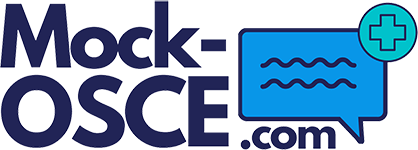Last week, on the 22nd November, we at Mock-OSCE.com, hosted our very first webinar. We welcomed participants from all over the world to sit back and listen to our discussion on all things OSCE (Objective Structured Clinical Examinations)! We had a full team on board which included our panel of guests, as well as the director of Mock-OSCE.com, Kelvin Nunn, taking over as the moderator of the webinar. The panel included three wonderful actors – Matt Avery, Mariana Spagadoros, and Sarah Beckett; who are all highly experienced in the OSCEs and participate as simulated patients regularly. Our fourth panellist and host of the webinar was our very own in-house educational psychologist, Gabia Neverauskaitė.
The webinar was opened up by Gabia, who introduced the panel and presented an overview of the importance of communication skills in medicine before letting our actors take the stage. A well-developed skill set poses many benefits including empowerment of patients, conflict resolution, beliefs and trust, and patient satisfaction among many other things. It was also highlighted that while communication skills can be easily taught, they can also be easily lost without practice – so it is important to keep that in mind throughout medical training and practice.
Our first actor, Matt, then took the stage and covered the topic of the “pre-OSCE” or tips on preparing for an OSCE. He offered guidance on things you can have ready before the onset of the exam such as appropriate attire and having the correct materials at hand. Matt recommended the Betari Box – a model that focuses on one’s behaviour and attitude – allowing oneself to appear more confident and relaxed, which would be an excellent asset before an exam. Nailing down your relaxation techniques, such as box breathing, was also a key point to help students calm those pre-test jitters.
Next up, we welcomed Mariana, who discussed the “mid-OSCE” or aspects to keep in mind during the OSCE. She offered valuable advice on making significant first impressions such as focusing on an open and neutral posture, having a gentle tone of voice, and using active gestures like hand movements or a smile during the exam. Mariana also enlightened us with useful questioning style tips such as incorporating both open and closed questions and making these questions as uncomplicated and specific as possible to avoid misinterpretation.
Our final actor, Sarah, explored the “post-OSCE” or reflections on the aftermath of an OSCE. The primary focus was on common areas for improvement which included creating rapport quickly, encouraging the patient to tell their story, and using empathy in a way that feels natural. Sarah also stressed the importance of time-management and a great tip is to combine the summary and explanation components within the exam.
Before opening the floor for questions, Gabia wrapped up the session by highlighting the effect of test anxiety on performance and how to overcome it.
Overall, we felt the webinar was a success – a variety of topics were covered by our panellists and we were able to experience the event through their own perspectives. We hope our participants enjoyed the experience as much as we did and we hope to see you again in 2023!

